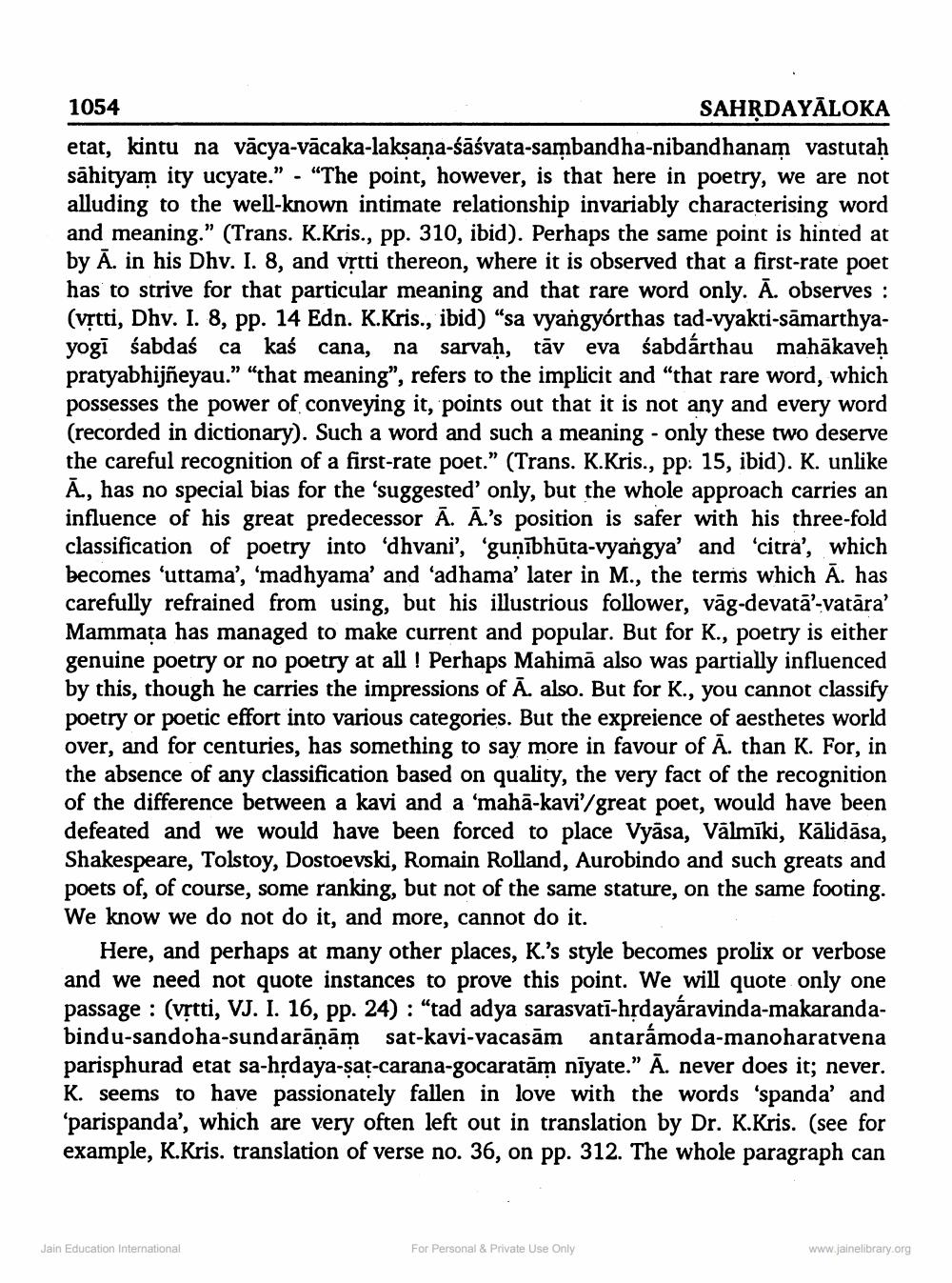________________
1054
SAHRDAYĀLOKA etat, kintu na vācya-vācaka-laksana-śāśvata-sambandha-nibandhanam vastutaḥ sāhityam ity ucyate." - "The point, however, is that here in poetry, we are not alluding to the well-known intimate relationship invariably characterising word and meaning." (Trans. K.Kris., pp. 310, ibid). Perhaps the same point is hinted at by .. in his Dhv. I. 8, and vrtti thereon, where it is observed that a first-rate poet has to strive for that particular meaning and that rare word only. Ā. observes : (vrtti, Dhv. I. 8, pp. 14 Edn. K.Kris., ibid) “sa vyangyórthas tad-vyakti-sāmarthya yogi sabdaś ca kaś cana, na sarvah, tāv eva sabdárthau mahākaveh pratyabhijñeyau.” “that meaning”, refers to the implicit and “that rare word, which possesses the power of conveying it, points out that it is not any and every word (recorded in dictionary). Such a word and such a meaning - only these two deserve the careful recognition of a first-rate poet." (Trans. K.Kris., pp. 15, ibid). K. unlike A., has no special bias for the 'suggested' only, but the whole approach carries an influence of his great predecessor Ā. Ā.'s position is safer with his three-fold classification of poetry into 'dhvani', 'gunībhūta-vyangya' and 'citra', which becomes 'uttama', 'madhyama' and 'adhama' later in M., the terms which Ā. has carefully refrained from using, but his illustrious follower, vāg-devatā’-vatāra' Mammata has managed to make current and popular. But for K., poetry is either genuine poetry or no poetry at all ! Perhaps Mahima also was partially influenced by this, though he carries the impressions of Ā. also. But for K., you cannot classify poetry or poetic effort into various categories. But the expreience of aesthetes world over, and for centuries, has something to say more in favour of Ā. than K. For, in the absence of any classification based on quality, the very fact of the recognition of the difference between a kavi and a 'mahā-kavi/great poet, would have been defeated and we would have been forced to place Vyāsa, Vālmīki, Kālidāsa, Shakespeare, Tolstoy, Dostoevski, Romain Rolland, Aurobindo and such greats and poets of, of course, some ranking, but not of the same stature, on the same footing. We know we do not do it, and more, cannot do it.
Here, and perhaps at many other places, K.'s style becomes prolix or verbose and we need not quote instances to prove this point. We will quote only one passage : (vịtti, VJ. I. 16, pp. 24) : “tad adya sarasvati-hğdayáravinda-makarandabindu-sandoha-sundarāņām sat-kavi-vacasām antarámoda-manoharatvena parisphurad etat sa-hrdaya-sat-carana-gocaratām niyate." .. never does it; never. K. seems to have passionately fallen in love with the words 'spanda' and 'parispanda', which are very often left out in translation by Dr. K.Kris. (see for example, K.Kris. translation of verse no. 36, on pp. 312. The whole paragraph can
Jain Education International
For Personal & Private Use Only
www.jainelibrary.org




